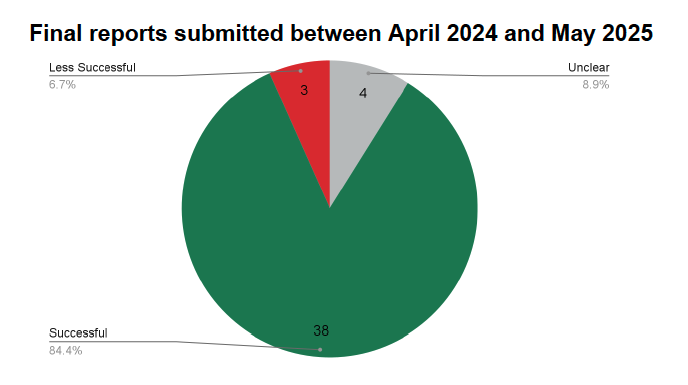Findings from the 2025 Grants Evaluation Team (GET)
As ARDC’s grants program continues to grow, so does the need to understand the impact of projects that receive our funding. That’s where the Grants Evaluation Team (GET) comes in. Formed in 2024, the GET is now in its second year of reviewing completed projects and determining whether or not the grantees stated goals were achieved. Their latest report offers their insights, and we’re pleased to share these findings with you.
To compile this report, the GET reviewed 45 final reports submitted between April 2024 and May 2025 from ARDC-funded projects. Over the course of six meetings, the team pointed out trends and learnings, and worked together to process the results.
In keeping with last year’s approach, the GET took a reflective approach, examining completed projects from multiple perspectives, and inviting the community to identify key takeaways. Specifically, their work centered on three guiding questions:
- Were these grant projects successful and a good use of funds?
- Are the process changes we’re implementing having an impact? If so, what are these impacts? If not, what are other process changes that we should consider implementing?
- What information should we be sharing back with our community?
Compared to last year, an even greater number of funded projects were successful in advancing ARDC’s goals:
- About 84% of projects were considered successful and a good use of funds, up from 71% in 2024. Notable successes include:
- The Internet Archive’s efforts to build out the Digital Library of Amateur Radio & Communications (DLARC),
- The Deep Space Exploration Society (DSES) facility upgrade, and
- Small dollar classroom education projects with involved teachers.
- Only 9% of projects had unknown outcomes, compared to 22% in 2024, and we also observed a higher rate of grantees submitting their final reports. These trends may reflect the positive impact of our recent process improvements.
- The increased success rate is not necessarily due to a more competitive application process. Rather, as the process has become more competitive, more projects that could likely accomplish good work get rejected.
- The GET identified potential strategies to get information on projects with longer term outcomes, such as R&D, museum projects, and emergency communications projects.
If you’d like to learn more about the GET’s latest findings, you can read the full report here: https://www.ardc.net/wp-content/uploads/2025-GET-Report-Public-version.pdf. If you have questions about ARDC’s grantmaking or want to discuss specific findings, feel free to reach out at giving@ardc.net.
